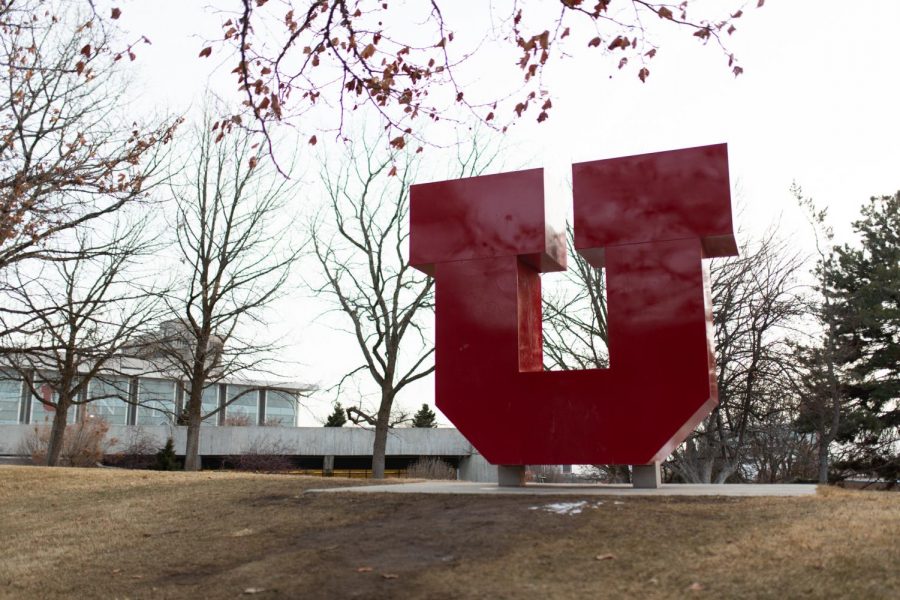Emeriti Club Offers Free Advice to U Students
Evening on University of Utah campus, Thursday in Salt Lake City. (Photo by Maya Fraser | The Daily Utah Chronicle)
February 12, 2023
About five years ago, University of Utah emeritus Lou Borgenicht sat at a coffee shop with a few of his friends as they did every Saturday morning when they had an idea — to go to the local farmers market and set up a table with a sign that read “old coots giving advice; it may be bad, but it’s free.” That was how a group of retirees — whom Borgenicht now affectionately refers to as “the coots” — first began their mission to advise the younger generation.
The coots were a hit at the farmer’s market, and soon, they were receiving national attention for their idea, even going so far as to be featured on CBS Sunday Morning.
They continued like that until before the Fall 2022 semester, when Ken Jameson, president of the Emeriti Club at the U, decided he wanted to try something similar to get himself and other retired professors back in touch with the student body.
“We had investigated doing a formal mentoring program and had gotten information on mentoring programs on campus, but it seemed like it was a pretty big commitment to our emeriti, and so this seemed to me maybe it would be a vehicle that we could again get the emeriti back in touch with students,” he said.
He talked with Borgenicht and they decided to try it at the U, but first, they had to run it by Student Services.
“I thought the initial reaction would be fairly negative,” Jameson said, adding he expected to be told that even though he was once a professor, he would not know how to handle students’ personal issues.
However, Student Services ended up being enthusiastic about the idea and immediately got Jameson in touch with staff at the student union and residence halls to set it up.
The Emeriti Club has been setting up their advice tables around campus for several months now, and Jameson said the experience has been largely positive for the emeriti.
“One of the first people who did it said she was gobsmacked, which means she was really hit over the head,” he said. “She had expected students to be on their phones and just ignoring people; she was just amazed at how open and responsive and interesting and interested they were.”
The tables have struck “a responsive chord” with the students as well, Borgenicht said, adding it’s “easier for them to ask people that they don’t know” but who still have the wisdom that comes with being older.
“It’s often difficult for kids to talk to their parents about things that they will talk to us about, for example, relationships or academic achievement,” Borgenicht said.
Jameson said the conversations are easier since the emeriti have no personal relationships with the students.
“I think they appreciate us being there and listening and being non-judgmental,” Jameson added. “I have six grandkids — and I have expectations of my grandkids. In terms of students, I can take them as they come.”
Many times, Jameson said, listening is more important to the students than the actual advice.
“They know they have to work out all of their own issues, but to have someone else that they can bounce that off of, I think, is often helpful too,” he said.
Jameson also said the advice tables are essential to the U’s community because “there’s a real gap generationally,” and this experience is one step towards erasing that.
“I think everybody appreciates cutting across those generational barriers, and we have stereotypes of your generation, and you have stereotypes of our generation,” he said. “And to get past that, I think, has been really helpful to everybody.”
Borgenicht agreed, adding that it allowed him to understand better “a group of people I never really would have much of a chance to truly comprehend except by this particular device.”
And, of course, the advice tables have not come without their fair share of stories. Borgenicht recalled a time from “the old days of the coots” when a young woman asked them if the shorts she was wearing made her “butt look big.”
“I can’t remember whether they did or didn’t, but we said, ‘no, of course not,’” he added.
To Borgenicht, stories like that are often the nature of what the coots and the Emeriti Club are attempting to do.
“I mean, a lot of the time, it’s basically defusing anxiety about anything whether it’s deciding what they want to do with their lives, whether it’s how their courses are going and that sort of thing,” Borgenicht said. “So it’s basically bringing them down from a state of anxiety and concern with just common sense advice.”








